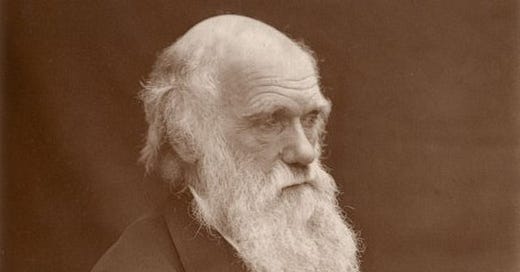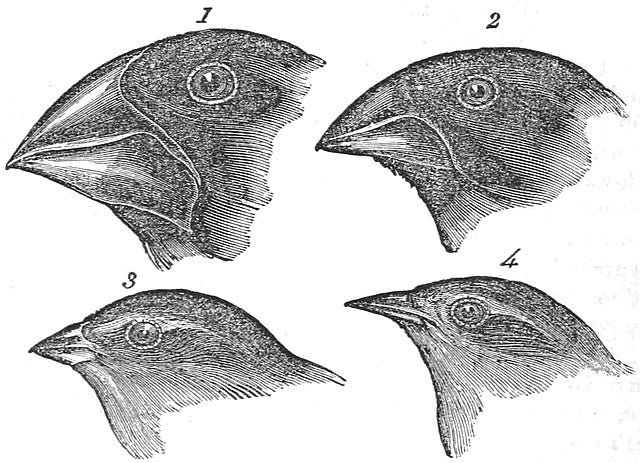A photograph of Charles Darwin by his son Leonard, circa 1874
I am not an evolutionary biologist. I’m a human ecologist (independent scholar) and eco-cultural philosopher, so biology deeply informs my work, but I’ve yet to take the leisure to read Darwin’s books, or to read in any depth about the history of evolutionary biology. It’s not that I wouldn’t enjoy leisurely hours in the shade of a locust tree in my local park, reading about how Darwin began to reason out how the various kinds of finches beaks emerged. But there are a thousand other books calling my attention all at once, and likely it will have to wait. My calling, especially lately, relates more to sociology, anthropology, psychology, cultural history — the sciences of human culture. And now — politics. It’s because we’re in trouble, and there will clearly not be any solutions to our planetary crisis which aren’t ultimately best understood as political solutions. Who has the leisure, in such times, to read Darwin?
I think I understand evolutionary biology in some sort of broad outline. And so I perhaps understand it well enough to have a very basic understanding of coevolution.
In biology, coevolution occurs when two or more species reciprocally affect each other's evolution through the process of natural selection. The term sometimes is used for two traits in the same species affecting each other's evolution, as well as gene-culture coevolution. - from Wikipedia, Coevolution
I’m bringing up evolutionary biology here because here in The R-Word I’ve been talking quite a lot about “the state”. And I now understand the modern state as something which evolved (and continues to evolve) — which is to say it emerged from (and with) other previous forms over time, through history, not unlike the beaks of finches. So cultural evolution is one among a couple of dozen fundamental ideas in what I’ve been writing about here in The R-Word. In particular, I’m very interested in how corporations co-evolved alongside — in relation to — the emergence of the modern state. My basic idea here is that the modern state and capitalism coevolved in much the same way flowers and pollinators (like bees, butterflies and moths) coevolved. These two forms — capitalism and the state — shaped one another in their evolutionary journey into this historical moment.
Those who read Merlin Sheldrake’s marvelous book, Entangled Life: How Fungi Make Our Worlds, Change Our Minds & Shape Our Futures, are brought on a journey with the author as he grapples with the challenge of discerning the boundary (if any) which distinguishes one species or class of organism from another. For example, there is fungal-bacterial endosymbiosis, in which it isn’t entirely clear that the two types of organisms are in any sense discrete from one another. They appear to be fused together rather than merely discrete symbionts.
A similar challenge at discerning the boundary between two named things can be discovered in relation to the state and capitalism, and in particular corporate capitalism. It is the state which legally forms the corporation. A corporation cannot be formed without the sanction of the state. But the boundary between the (private) corporate form and the (public) state form is not entirely clear. It is vague and ambiguous at best. The more carefully we observe the state (governments) the more entangled they appear to be with corporations, big business and billionaires (and a few multi-millionaires). The institutionalization (functions and functioning) of ideology between the state and the corporation, in evolutionary process, reveal a progressive fusing of these two apparent entities into a singular organism-like entity. This organism-like entity is called the Megamachine by Fabien Scheidler, author of The End of the Megamachine.
In Counterpunch, Patrick Mazza describes the gist of what Sheidler says in his book. In some ancient civilizations …
Rulers forced farmers to pay taxes in the form of grain, accumulating the currency of food in temples, controlling distribution. Around 2500 BC came the first evidence of land ownership in the early empire of Sumer. Writing and the first legal codes came about to record and enforce tax obligations and property ownership. With failure to pay taxes and debts came enslavement. Around this time also came the first religions with a singular, dominating god.
These were the origins of what Scheidler describes as the four tyrannies: the physical violence of the state; the structural violence of economic coercion; the ideology to justify inequalities, and linear thinking asserting control of nature on which the first three tyrannies were built. These four tyrannies form the basis of the Megamachine, a term Scheidler draws from Lewis Mumford. The Megamachine is a pyramidal structure which forces people to look up to hierarchical peaks, rather than relating to each other on an eye-to-eye basis. [emphasis added]
The Megamachine has a history. It is a millennia old history of domination, coercion, hierarchy, control and oppression. The modern nation state, though it likes to call itself ‘democratic,’ is nevertheless a thinly disguised (at best) continuation of the patterns which comprise this picture of the Megamachine. We may have voting booths, but do we have democracy—really? Would a democracy be organized into an oppressive, life-destroying Megamachine? My thesis in these writings within The R-Word is that, no, it would not. Further, I’m gradually laying out a story … a story I will call Ruin & Departure. We who dwell in the ghastly beast called The Megamachine dwell in the most ruinous culture the world has ever seen. Global ecosystems—and human societies—are in various stages of collapse (Ruin). They are self-regenerating, so the fact that life as we know it is in various stages of collapse doesn’t mean ecosystems and the biosphere cannot heal and repair themselves. What it does mean is that we must depart from the Megamachine if the healing is to begin.
To depart — to engage in Departure (which I capitalize when speaking of Ruin and Departure in my proposed theory and praxis — would require a cooperative, collaborative, revolutionary movement in which we empower one another in Departure. Departure is in part about becoming non-dependent upon Ruin to have livelihood. In Departure, we walk away from the Megamachine and create a new mode of livelihood which doesn’t cause Ruin, and in which ecosystems and the biosphere are allowed to heal.
The odds are against us; let’s be honest. But we can increase our odds by knowing where we are and how we got here. Effective theory and praxis depend on understanding how the Megamachine evolved. We have to understand why it is that the leopard has not been changing its spots, and why we should not waste too much time trying to force it to. We will also need to learn not to put all of our eggs in the electoral and ‘policy’ baskets. This is not a safe place for our valuable eggs!
A big part of why the Megamachine does not change its spots comes down to hierarchy. What do corporations, businesses (most of them) and the state have in common? They arrange decision-making power into hierarchies. It’s what they do. It’s who and what they are. But there is another way to organize societies, and the result is not chaos, violence and madness. Indeed, this other way — a non-hierarchical way — is likely our only way to end the chaos, violence and madness.
Stay tuned. I plan to say a lot more about Ruin & Departure as theory and praxis over the coming days, weeks, months and years.






I'm only partway into watching this video documentary which is about the ideas in a book Jeremy Lent of Deep Transformation Network - https://deeptransformation.network/ - recommended to me. But it's looking good so far! It's inspiring a few interesting insights about how we might give structure and form to an alternative social system and politics. (E.g., why not borrow some insights from biomemetics - https://en.wikipedia.org/wiki/Biomimetics - to design a more functional form of politics? (!) I ought to discuss this idea with Jeremy Lent, provided he can pull away from the writing of his next book.
https://www.youtube.com/watch?v=VunUVvGFpb4&t=3s
And this is the book: https://www.converge.net/book
I plan to read this book soon, though I have too many books open at the moment!